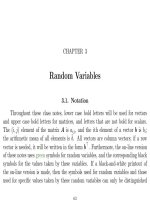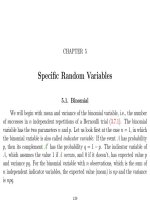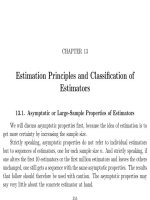20110921 class notes
Bạn đang xem bản rút gọn của tài liệu. Xem và tải ngay bản đầy đủ của tài liệu tại đây (386.97 KB, 51 trang )
st
1 session:
Introduction to Accounting
Objectives
•
•
•
Develop the ability to read, analyze and interpret financial statements
Understand how financial accounting statements are constructed
Provide you with tools for economic decision making
– Where to find information
– How the information got there
Textbook
•
•
Financial & Management Accounting, an Introduction by Pauline Weetman, 5th
edition, available in two forms:
– Softcover
– E-book
Register on Prentice Hall website for additional materials! (Process to be announced
in class, next time.)
Rules of the Game
•
•
•
•
•
Read the assigned material, do the assigned problems before the lecture
Come to class on time
Do the assignments on a timely basis
Turn off cell phones and other communication devices
Ask questions and participate in class
Course Website & e-mail
I will use the schools e-learning portal to post information.
Make sure you log in at:
/>
Email:
GRADING SCHEME
Final grades will be determined by the following scheme:
– Assignments
– Midterm
– Final:
10%
40%
50%
FIRM OF THE DAY
Today’s Class
Overview of “Accounting” in general and “Financial Accounting” in particular
Discussion of Accounting terminology
Mandatory Financial Reporting (including the Financial Statements)
Financial Accounting
•
Financial accounting is the language that translates economic events into
uniform and comprehensive information, understandable by OUTSIDE observers.
•
Unfortunately, this language has become extremely complex and
heterogeneous…
•
This is naturally a bad thing for the outside observers.
In an ideal world…
“In an ideal world, the user of financial statements could focus only on the bottom lines of
financial reporting. If financial statements were comparable among companies, consistent
over time, and always fully reflecting the economic positions of the firms, financial
statement analysis would be simple.”
Adapted CFA Preparation Readings
Other Types of Accounting
(not covered in this course)
Tax Preparation and Compliance is pretty self-explanatory
Internal Information Systems and Reporting provides firm managers useful, real-time performance information to help with
decision making
Also referred to as Management Information Systems and/or Managerial Accounting
Key element here is that information is for internal use only
Therefore, there are typically few rules to govern how this “should be” done.
Information systems are designed specifically to cater to a single firm’s managers’ needs, hence there is little
standardization
General business performance consulting has attracted many accountants since accountants are typically familiar with many
facets of firm operations
Who cares?
“Information Useful in Investment and Credit Decisions
Financial reporting should provide information that is useful to present and potential
investors and creditors and other users in making rational investment, credit and similar
decisions. The information should be comprehensible to those who have a reasonable
understanding of business and economic activities and are willing to study the information
with reasonable diligence.”
SFAC 1, paragraph 34.
Who cares?
• Credit and equity investors
Or, in other words:
• Agents in Capital Markets!
Types of Firm Ownership and Information Demand
There are generally three types of firms in two major categories of ownership
Privately Held Firms:
1. Proprietorship—typically a small firm with one specific owner
2. Partnership—typically medium-sized firms with shared ownership
Publicly Held (or Traded) Firms:
3. Corporation—typically large firms with diverse ownership
Ownership rights can be bought or sold on an open market
We will talk primarily about corporations throughout this course since virtually all corporations must create
and file financial reports
Why do publicly-traded Corporations have to file financial reports? Monitoring
Separation of ownership (shareholders) and control (hired managers) presents a classic principal-agent
problem (agency theory)
Agency theory suggests that, without proper monitoring and incentives, agents will extract
perquisites (Jensen and Meckling, 1976)
Financial reports are one mechanism to help monitor managers’ actions
Why do publicly-traded Corporations have to file financial reports?
Investing
•
•
•
•
It is true that accounting information relates to past economic events. Whereas capital
market investors are worried with future value.
Financial analysis is therefore mostly a way to anticipate future economic events from
information about past ones.
Statistical techniques provide the tools for this.
Financial analysis doesn’t tell what will happen, but it tells you what can happen. There is a
chance of things going wrong. This chance defines risk and it can be measured.
Risk vs Return
•
Equity vs Credit Investors
If you want to share more risk and become a partner of the firm, then you want to know the
potential growth of the firm and basically you want to know all the info you can get: you
want to be an equity investor!
•
If you want to limit your risk and you are a creditor, then your concern will be the potential
ability of the borrower to pay.
•
In between there is a rich palette of different flavors of investors, concerned with accurate
information for their investments.
Financial Reporting
(Key Players)
Managers
Ultimately responsible for the information disclosed
Financial information reflects the economic outcome of their decisions
May have their compensation linked to some financial numbers
Do possess some discretion power as to some of the decisions conditioning the financial information
Shareholders
Can hire or fire managers
Use financial information to evaluate the performance of the managers
Use financial information to make investment decisions
Financial Reporting
(Key Players)
Financial Accountant
Hired by a firm to help prepare the firm’s financial reports
Usually works beneath the senior supervision of the Chief Financial Officer
Head Financial Accountant is usually called the Controller
Auditor
Independent Agent hired by the firm to regularly assess and attest to the financial reporting quality of the firm
Maintains an on-going relationship with the firm (the audit client) to allow for regular inspection of financial
processes and internal controls over financial processes
Typically works for a “CPA Firm”
Financial Reporting
(Key Players)
Auditor (continued)
Few major national “CPA Firms” exist, due to mergers and Enron
Many of these firms also offer internal control compliance consulting services
Other potential users of the informations
•
Authorities: government, regulatory bodies, and tax authorities
– They want the information to monitor whether their policies are been executed.
•
General public and special interest groups: labor unions, environmentalist, consumer
groups.
– They want specific information that help them protect their interests.
•
Competitors:
– They want information to gain competitive edge.
Other professions using the information
•
ANALYSTS:
–
•
CONSULTANTS:
–
•
They want clear information that easily signals wrongdoings.
CORPORATE LAWYERS:
–
•
They want the information to be exclusive.
AUDITORS:
–
•
They want the information to be vast!
They want normative (ambiguous) information…
ACADEMICS:
–
They want the information to be consistent with some rationality.
Rules for everyone?
•
Can the financial reporting system keep everyone happy?
–
•
How does the system deal with this?
–
–
•
Obviously not! There are contradicting incentives surrounding accounting information.
By hearing as many people as possible.
By aiming at simpler rules, that shift most of the responsibility to the preparers of information.
What’s the implication for financial analysis?
–
There is a lot of room for ambiguity and a lot of need for interpretation.
Financial Reporting System
Who decides what constitutes Generally Accepted Accounting Principles (GAAP)?
•
SEC
Securities and Exchange Commission
/>
–
–
“The mission of the U.S. Securities and Exchange Commission is to protect investors, maintain fair,
orderly, and efficient markets, and facilitate capital formation.”
They do not set the accounting rules. They simply tell publicly traded firms what rules to follow and
what information to disclose. (Regulation S-X)
Financial Reporting System
•
AICPA
American Institute of Certified Public Accountants
–
/>“Its mission is to provide members with the resources, information, and leadership that enable them
to provide valuable services in the highest professional manner to benefit the public as well as
employers and clients. ”
–
It is a professional organization for American accountants.









